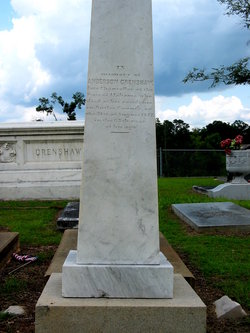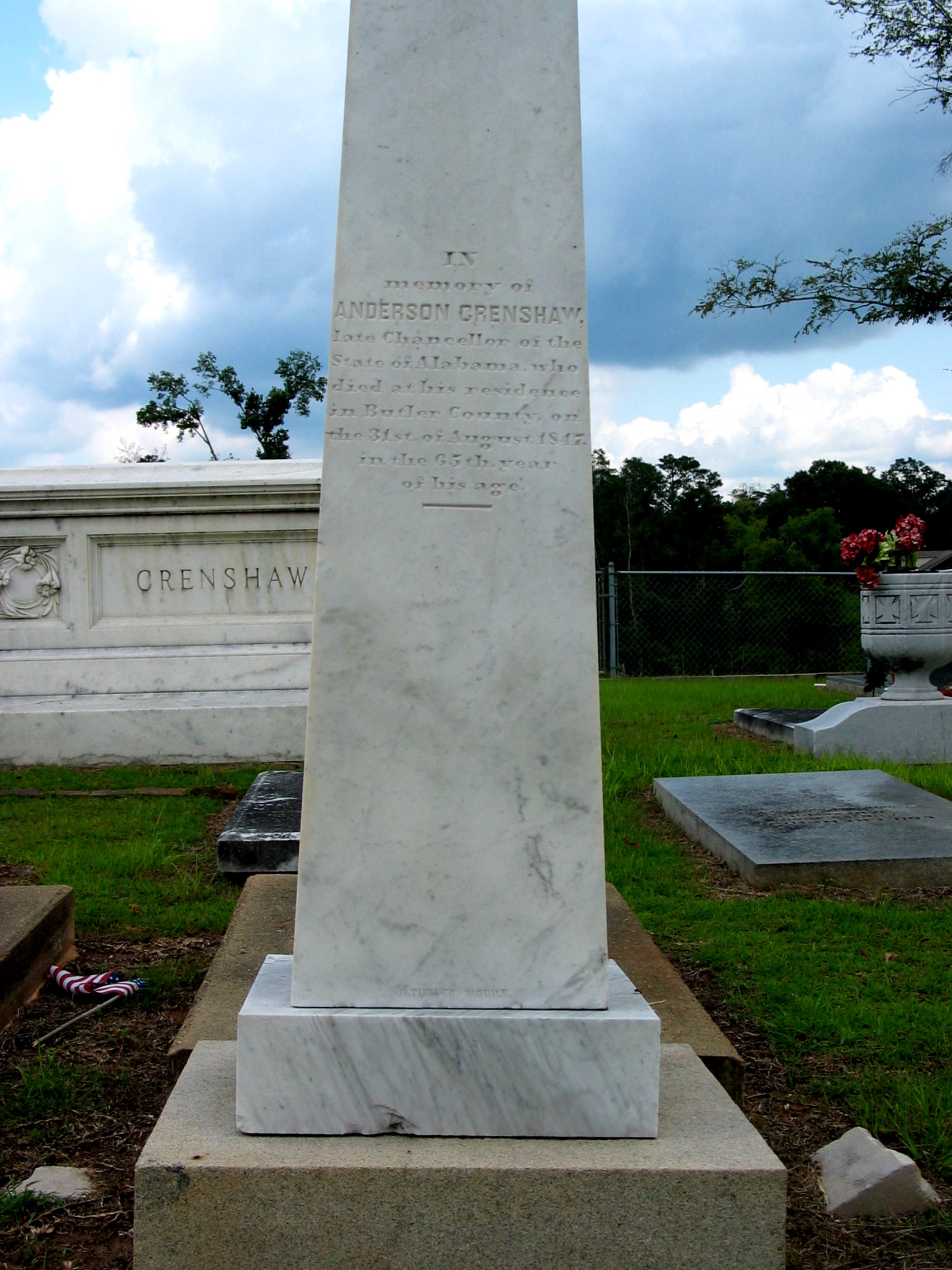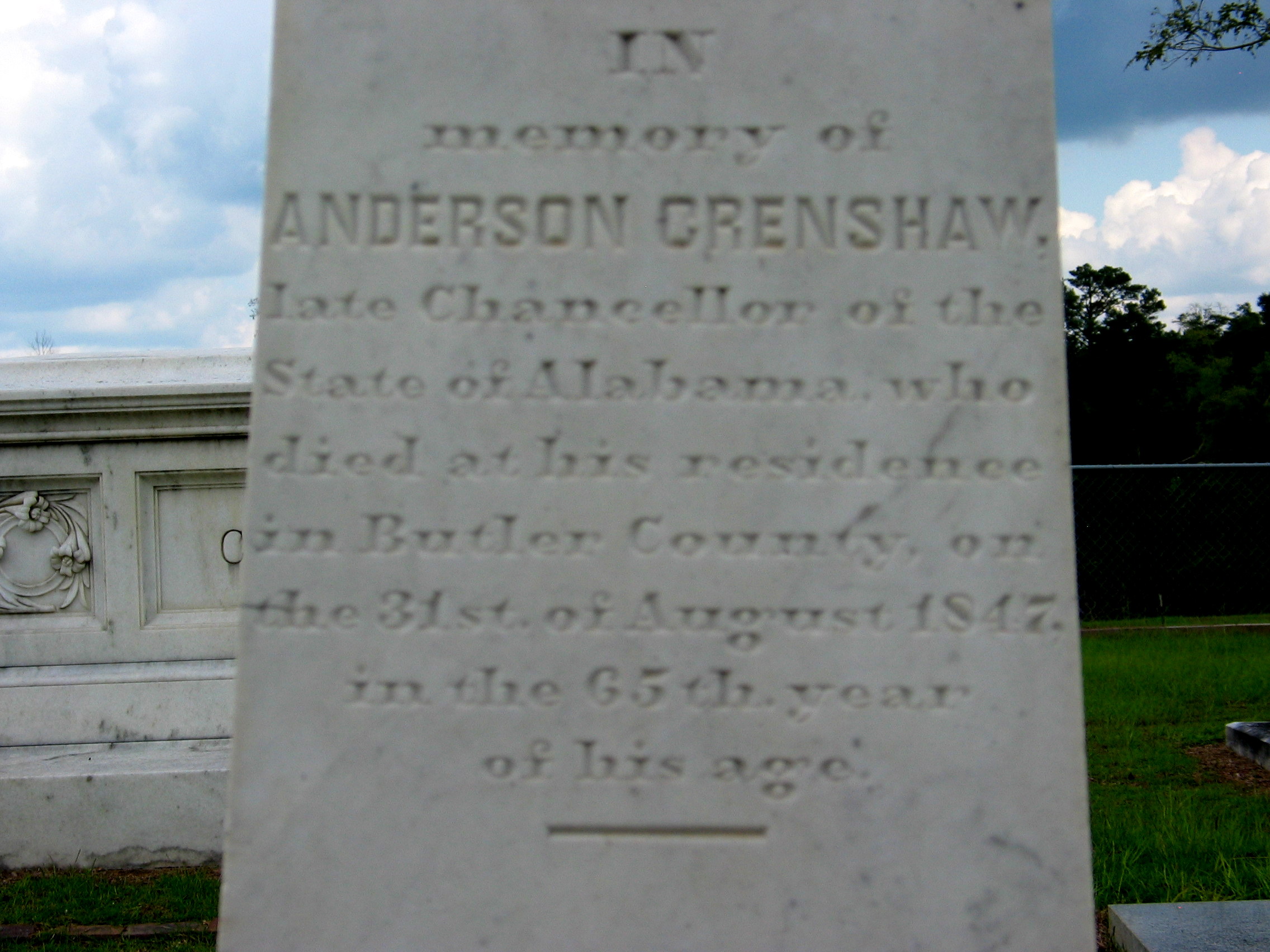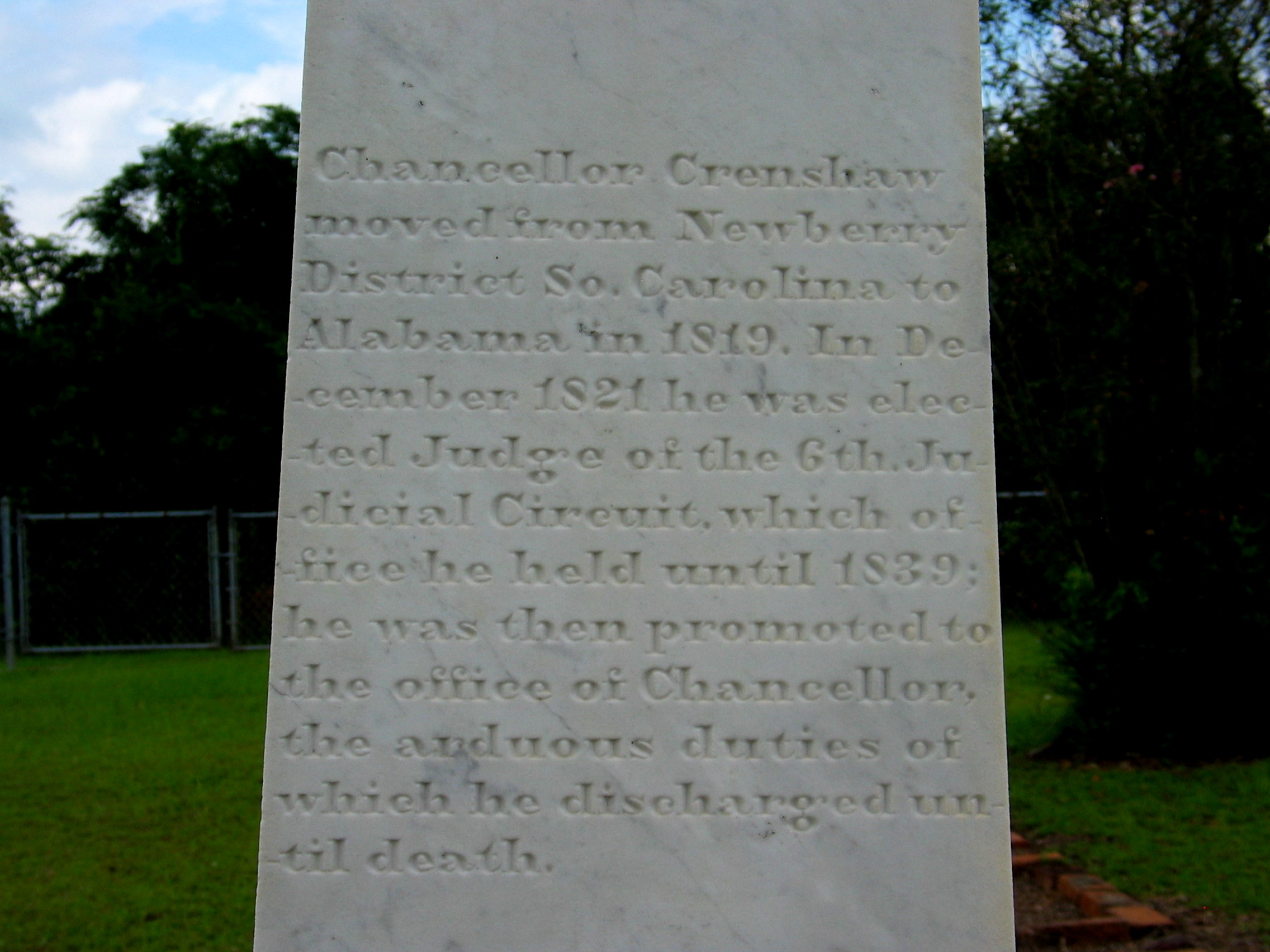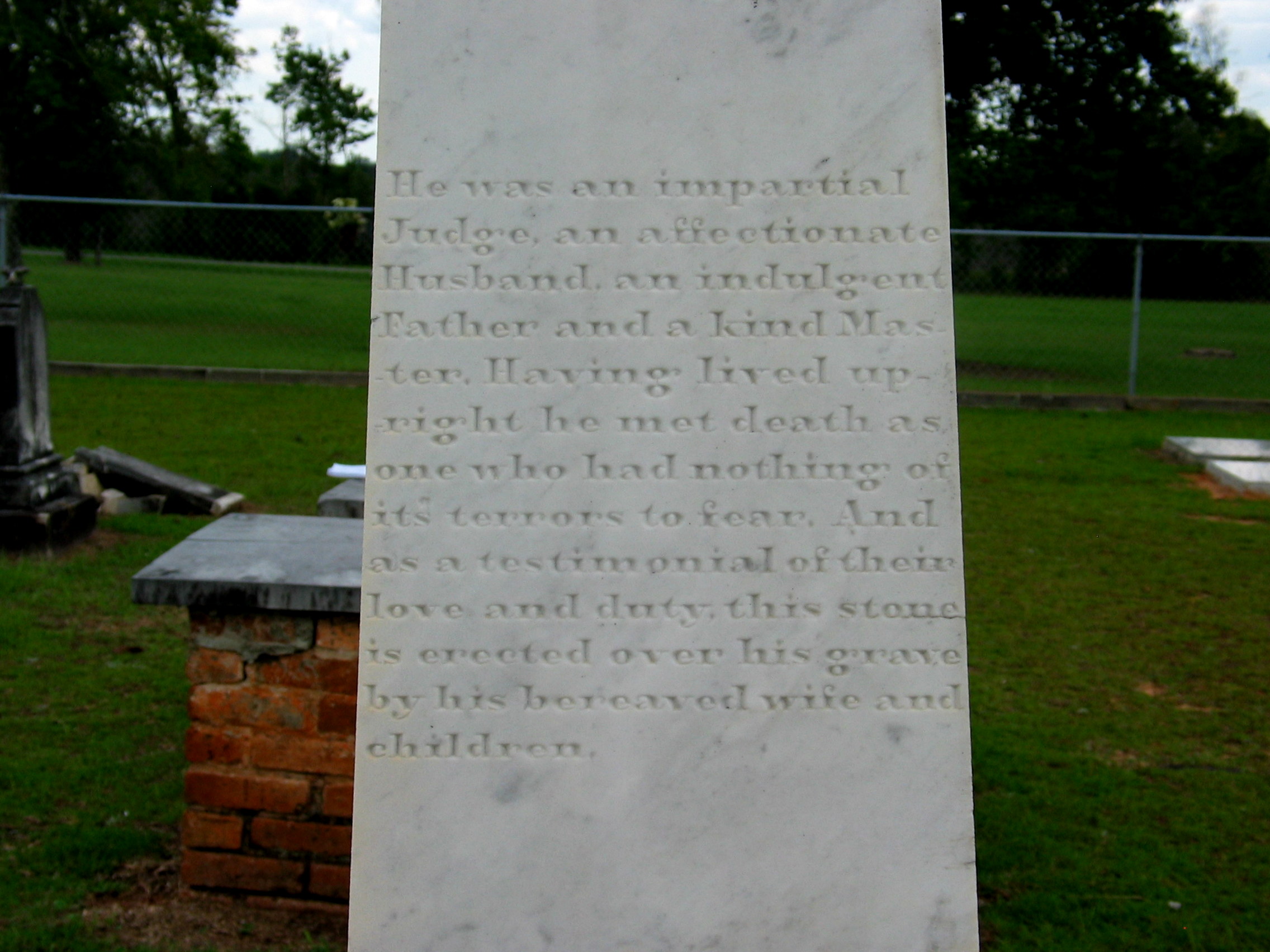Raised in Newberry District, South Carolina after parents settled there from Virginia
1806 - First graduate of South Carolina College (now University of South Carolina)
1809 - Passed South Carolina state bar exam
War of 1812 - served as aide-de-camp to South Carolina Governor Alston
1816 - Married Mary Chiles, his first cousin once removed
1819 - Moved to Alabama settled at Cahaba, the state's first capital
1820 - Elected first mayor of Cahaba. First bank of State of Alabama was organized in Anderson's law office in Cahaba
1821 - Elected Alabama circuit judge
1822 - Moved to Butler County, settling on The Ridge
1838 - became "Chancellor" of the Southern Division of Alabama courts
1847 - Died in Butler County, Alabama
Making their home on The Ridge in the northwestern section of Butler County, Anderson and Mary raised their four surviving children (their only daughter had died at Cahaba): Walter Henry, Thomas Chiles, Charles Edward and Frederick William. They adopted a young girl, Adah Thigpen, after having lost their only daughter in infancy at Cahaba. There on The Ridge, high on a hill facing the road to the Alabama River, Judge Crenshaw built his plantation home in 1835. He died at this home in 1847.
Crenshaw County, Alabama, created from the eastern portion of Butler County, was named in Anderson Crenshaw's honor shortly after the War Between the States.
From the Judge's sons (each of whom, like their father, married a cousin) there are thousands of descendants today throughout the United States and in several foreign countries. They have been a part of our country's history for many generations, and have included people such as Alabama's president of the Senate in 1865; the first Auburn University graduate with a degree in mining engineering in 1890; the only Confederate officer to serve in the army and the marines, serve on an ironclad and in blockade running; and the first aviator in the world to make an instrument landing aboard an aircraft carrier, in 1935.
Descendants have included talented individuals of all ages, such as Jennie Vieve Crenshaw Poole, the artist who painted the Crenshaw family cookbook cover portrait of Judge Crenshaw's home (and lived to be nearly 100 years old); and Texas championship golfer Ben Daniel Crenshaw, great-great-great-grandson of the Judge, with family roots in Montgomery County, Alabama.
Judge Anderson Crenshaw's biographical entry in Garrett's Reminiscences of Public Men of Alabama (1872) includes these comments: "He was a Whig in politics, but so moderate in his views and feelings, and so devoted to the duties of the high places he occupied, that the question of party politics was never brought to bear upon him, in consequence of which he was retained in office under elections of the legislature, when large democratic majorities existed. His virtues as a man, and his abilities and integrity as a judge, gained the public confidence from the beginning of his long administration of justice, which he retained to the last. Nothing more need be added to such a pregnant record of success."
Raised in Newberry District, South Carolina after parents settled there from Virginia
1806 - First graduate of South Carolina College (now University of South Carolina)
1809 - Passed South Carolina state bar exam
War of 1812 - served as aide-de-camp to South Carolina Governor Alston
1816 - Married Mary Chiles, his first cousin once removed
1819 - Moved to Alabama settled at Cahaba, the state's first capital
1820 - Elected first mayor of Cahaba. First bank of State of Alabama was organized in Anderson's law office in Cahaba
1821 - Elected Alabama circuit judge
1822 - Moved to Butler County, settling on The Ridge
1838 - became "Chancellor" of the Southern Division of Alabama courts
1847 - Died in Butler County, Alabama
Making their home on The Ridge in the northwestern section of Butler County, Anderson and Mary raised their four surviving children (their only daughter had died at Cahaba): Walter Henry, Thomas Chiles, Charles Edward and Frederick William. They adopted a young girl, Adah Thigpen, after having lost their only daughter in infancy at Cahaba. There on The Ridge, high on a hill facing the road to the Alabama River, Judge Crenshaw built his plantation home in 1835. He died at this home in 1847.
Crenshaw County, Alabama, created from the eastern portion of Butler County, was named in Anderson Crenshaw's honor shortly after the War Between the States.
From the Judge's sons (each of whom, like their father, married a cousin) there are thousands of descendants today throughout the United States and in several foreign countries. They have been a part of our country's history for many generations, and have included people such as Alabama's president of the Senate in 1865; the first Auburn University graduate with a degree in mining engineering in 1890; the only Confederate officer to serve in the army and the marines, serve on an ironclad and in blockade running; and the first aviator in the world to make an instrument landing aboard an aircraft carrier, in 1935.
Descendants have included talented individuals of all ages, such as Jennie Vieve Crenshaw Poole, the artist who painted the Crenshaw family cookbook cover portrait of Judge Crenshaw's home (and lived to be nearly 100 years old); and Texas championship golfer Ben Daniel Crenshaw, great-great-great-grandson of the Judge, with family roots in Montgomery County, Alabama.
Judge Anderson Crenshaw's biographical entry in Garrett's Reminiscences of Public Men of Alabama (1872) includes these comments: "He was a Whig in politics, but so moderate in his views and feelings, and so devoted to the duties of the high places he occupied, that the question of party politics was never brought to bear upon him, in consequence of which he was retained in office under elections of the legislature, when large democratic majorities existed. His virtues as a man, and his abilities and integrity as a judge, gained the public confidence from the beginning of his long administration of justice, which he retained to the last. Nothing more need be added to such a pregnant record of success."
Family Members
Advertisement
Advertisement
